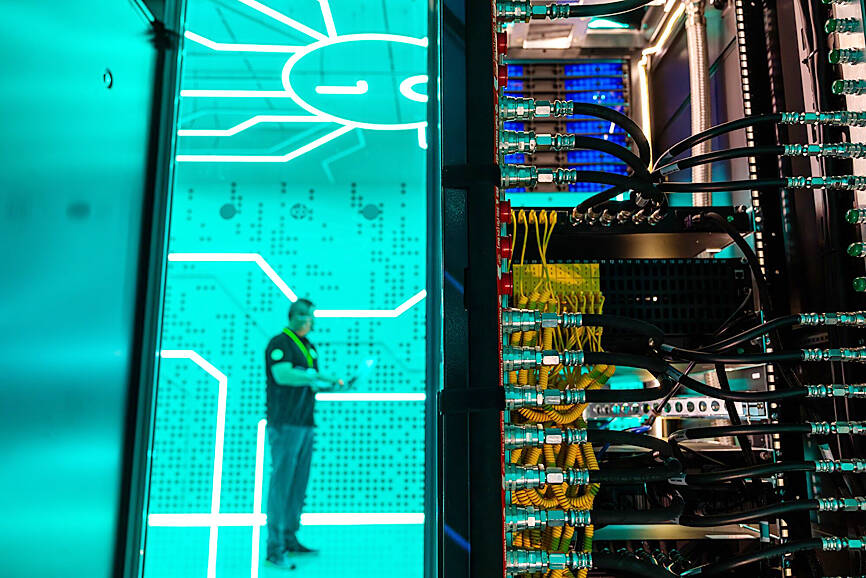Quanta Computer Inc (廣達), which supplies artificial intelligence (AI) servers powered by Nvidia Corp technology, on Wednesday kept unchanged its AI-related business revenue growth forecast, adding that it expected it to grow significantly next year.
The company is on track to meet that goal, Quanta chief financial officer Elton Yang (楊俊烈) told an online conference.
AI server revenue already accounted for more than 70 percent of Quanta’s total server revenue in the first three quarters of this year, and is to account for more than 80 percent of its total server revenue next year, Yang said.

Photo: Bloomberg
Amid strong client demand, the company now has AI server order visibility through 2027, and expects its server production capacity to double, he said.
Shipments of its new-generation AI servers powered by Nvidia’s GB300 units are gradually entering the mass-production phase, and are expected to ramp up next year, he said.
Some major customers have shifted orders to new AI servers from the previous generation, Quanta said.
It has seen sequential growth in AI server revenue last quarter, thanks to the smooth transition.
Nvidia’s next-generation Vera Rubin platform is scheduled to enter mass production in the second half of next year, which is expected to further boost Quanta’s shipping momentum, Yang said.
Quanta is also working with customers to assemble AI servers powered by application-specific integrated circuits (ASIC), he said.
The company’s expects ASIC-based AI server shipments to double next year from this year, he added.
While shipments of general-purpose servers this quarter are expected to be lower than the previous quarter, AI server revenue is still expected to post double-digit percentage sequential growth on the back of strong demand, he said.
Shipments of general-purpose servers are expected to grow by a high double-digit percentage this year from last year, he said.
Server revenue accounted for about 70 percent of its total revenue last quarter.
Notebook computers are expected to account for less than 20 percent of revenue next year, with notebook shipment growth likely to align with overall industry trends, Quanta said.
Quanta expects a double-digit percentage sequential decline in notebook shipments this quarter.
Overall, net profit decreased 0.12 percent annually to NT$16.43 billion (US$528.62 million) from NT$16.63 billion, the company said.
On a quarterly basis, net profit also decreased 0.25 percent from NT$16.86 billion, it said.
Earnings per share shrank to NT$4.26 from NT$4.32 a year earlier and NT$4.37 in the second quarter.
Gross margin fell to 6.85 percent, down from 7.33 percent a year earlier and 7.05 percent in the previous quarter, attributable to sharp exchange rate fluctuations and geopolitical uncertainties.
With the rising share of AI server shipments, gross margin is expected to come under further pressure, Quanta said.

SEMICONDUCTORS: The German laser and plasma generator company will expand its local services as its specialized offerings support Taiwan’s semiconductor industries Trumpf SE + Co KG, a global leader in supplying laser technology and plasma generators used in chip production, is expanding its investments in Taiwan in an effort to deeply integrate into the global semiconductor supply chain in the pursuit of growth. The company, headquartered in Ditzingen, Germany, has invested significantly in a newly inaugurated regional technical center for plasma generators in Taoyuan, its latest expansion in Taiwan after being engaged in various industries for more than 25 years. The center, the first of its kind Trumpf built outside Germany, aims to serve customers from Taiwan, Japan, Southeast Asia and South Korea,

Gasoline and diesel prices at domestic fuel stations are to fall NT$0.2 per liter this week, down for a second consecutive week, CPC Corp, Taiwan (台灣中油) and Formosa Petrochemical Corp (台塑石化) announced yesterday. Effective today, gasoline prices at CPC and Formosa stations are to drop to NT$26.4, NT$27.9 and NT$29.9 per liter for 92, 95 and 98-octane unleaded gasoline respectively, the companies said in separate statements. The price of premium diesel is to fall to NT$24.8 per liter at CPC stations and NT$24.6 at Formosa pumps, they said. The price adjustments came even as international crude oil prices rose last week, as traders

POWERING UP: PSUs for AI servers made up about 50% of Delta’s total server PSU revenue during the first three quarters of last year, the company said Power supply and electronic components maker Delta Electronics Inc (台達電) reported record-high revenue of NT$161.61 billion (US$5.11 billion) for last quarter and said it remains positive about this quarter. Last quarter’s figure was up 7.6 percent from the previous quarter and 41.51 percent higher than a year earlier, and largely in line with Yuanta Securities Investment Consulting Co’s (元大投顧) forecast of NT$160 billion. Delta’s annual revenue last year rose 31.76 percent year-on-year to NT$554.89 billion, also a record high for the company. Its strong performance reflected continued demand for high-performance power solutions and advanced liquid-cooling products used in artificial intelligence (AI) data centers,

SIZE MATTERS: TSMC started phasing out 8-inch wafer production last year, while Samsung is more aggressively retiring 8-inch capacity, TrendForce said Chipmakers are expected to raise prices of 8-inch wafers by up to 20 percent this year on concern over supply constraints as major contract chipmakers Taiwan Semiconductor Manufacturing Co (TSMC, 台積電) and Samsung Electronics Co gradually retire less advanced wafer capacity, TrendForce Corp (集邦科技) said yesterday. It is the first significant across-the-board price hike since a global semiconductor correction in 2023, the Taipei-based market researcher said in a report. Global 8-inch wafer capacity slid 0.3 percent year-on-year last year, although 8-inch wafer prices still hovered at relatively stable levels throughout the year, TrendForce said. The downward trend is expected to continue this year,